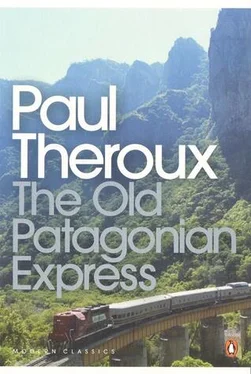Paul Theroux - The Old Patagonian Express - By Train Through the Americas
Здесь есть возможность читать онлайн «Paul Theroux - The Old Patagonian Express - By Train Through the Americas» весь текст электронной книги совершенно бесплатно (целиком полную версию без сокращений). В некоторых случаях можно слушать аудио, скачать через торрент в формате fb2 и присутствует краткое содержание. Год выпуска: 2008, Издательство: Penguin Books Ltd, Жанр: Путешествия и география, на английском языке. Описание произведения, (предисловие) а так же отзывы посетителей доступны на портале библиотеки ЛибКат.
- Название:The Old Patagonian Express: By Train Through the Americas
- Автор:
- Издательство:Penguin Books Ltd
- Жанр:
- Год:2008
- ISBN:нет данных
- Рейтинг книги:5 / 5. Голосов: 1
-
Избранное:Добавить в избранное
- Отзывы:
-
Ваша оценка:
- 100
- 1
- 2
- 3
- 4
- 5
The Old Patagonian Express: By Train Through the Americas: краткое содержание, описание и аннотация
Предлагаем к чтению аннотацию, описание, краткое содержание или предисловие (зависит от того, что написал сам автор книги «The Old Patagonian Express: By Train Through the Americas»). Если вы не нашли необходимую информацию о книге — напишите в комментариях, мы постараемся отыскать её.
The Old Patagonian Express: By Train Through the Americas — читать онлайн бесплатно полную книгу (весь текст) целиком
Ниже представлен текст книги, разбитый по страницам. Система сохранения места последней прочитанной страницы, позволяет с удобством читать онлайн бесплатно книгу «The Old Patagonian Express: By Train Through the Americas», без необходимости каждый раз заново искать на чём Вы остановились. Поставьте закладку, и сможете в любой момент перейти на страницу, на которой закончили чтение.
Интервал:
Закладка:
Borges was laughing in a pitying, self-amused way. His face lit up.
'They thought they were natives! I overheard a black woman saying to an Argentine woman, "Well, at least we didn't come here on a ship!" She meant that she considered the Spanish to be immigrants. "At least we didn't come here on a ship!" '
'When did you hear this?'
'So many years ago,' said Borges. 'But the Negroes were good soldiers. They fought in the War of Independence.'
'So they did in the United States,' I said. 'But a lot were on the British side. The British promised them their freedom for serving in the British infantry. One Southern regiment was all black — Lord Dunmore's Ethiopians, it was called. They ended up in Canada.'
'Our blacks won the Battle of Cerrito. They fought in the war against Brazil. They were very good infantrymen. The gauchos fought on horseback, the Negroes didn't ride. There was a regiment — the Sixth. They called it — not the Regiment of Mulattoes and Blacks, but in Spanish "the Regiment of Brownies and Darkies". So as not to offend them. In Martin Fierro, they are called "men of humble colour". .well, enough, enough. Let's read Arthur Gordon Pym.'
'Which chapter? How about the one where the ship approaches full of corpses and birds?'
'No, I want the last one. About the dark and the light.'
I read the last chapter, where the canoe drifts into the Antarctic, the water growing warmer and then very hot, the white fall of ashes, the vapour, the appearance of the white giant. Borges interrupted from time to time, saying in Spanish, 'That is enchanting,' 'That is lovely' and 'How beautiful!'
When I finished, he said, 'Read the last chapter but one.'
I read Chapter 24, Pym's escape from the island, the pursuit of the maddened savages, the vivid description of vertigo. That long terrifying passage delighted Borges, and he clapped his hands at the end.
Borges said, 'Now how about some Kipling? Shall we puzzle out "Mrs Bathurst" and try to see if it is a good story?'
I said, 'I must tell you that I don't like "Mrs Bathurst" at all.'
'Fine. It must be bad. Plain Tales from the Hills then. Read "Beyond the Pale".'
I read 'Beyond the Pale', and when I got to the part where Bisesa sings a love song to Trejago, her English lover, Borges interrupted, reciting,
Alone upon the housetops, to the North
I turn and watch the lightning in the sky, -
The glamour of thy footsteps in the North,
Come back to me, Beloved, or I die!
'My father used to recite that one,' said Borges. When I had finished the story, he said, 'Now you choose one.'
I read him the opium-smoker's story, 'The Gate of the Hundred Sorrows'.
'How sad that is,' said Borges. 'It is terrible. The man can do nothing. But notice how Kipling repeats the same lines. It has no plot at all, but it is lovely.' He touched his suit jacket. 'What time is it?' He drew out his pocket watch and touched the hands. 'Nine-thirty — we should eat.'
As I was putting the Kipling book back into its place — Borges insisted that the books must be returned to their exact place — I said, 'Do you ever re-read your own work?'
'Never. I am not happy with my work. The critics have greatly exaggerated its importance. I would rather read' — he lunged at the bookshelves and made a gathering motion with his hands — ''real writers. Ha!' He turned to me and said, 'Do you re-read my work?'
'Yes. "Pierre Menard"-'
'That was the first story I ever wrote. I was thirty-six or thirty-seven at the time. My father said, "Read a lot, write a lot, and don't rush into print" — those were his exact words. The best story I ever wrote was "The Intruder". And "South" is also good. It's only a few pages. I'm lazy — a few pages and I'm finished. But "Pierre Menard" is a joke, not a story.'
'I used to give my Chinese students "The Wall and the Books" to read.'
'Chinese students? I suppose they thought it was full of howlers. I think it is. It is an unimportant piece, hardly worth reading. Let's eat.'
He got his stick from the sofa in the parlour and we went out, down in the narrow lift, and through the wrought-iron gates. The restaurant was around the corner -1 could not see it, but Borges knew the way. So the blind man led me. Walking down this Buenos Aires street with Borges was like being led through Alexandria by Cavafy, or through Lahore by Kipling. The city belonged to him, and he had had a hand in inventing it.
The restaurant was full this Good Friday night, and it was extremely noisy. But as soon as Borges entered, tapping his stick, feeling his way through the tables he obviously knew well, a hush fell upon the diners. Borges was recognized, and at his entrance all talking and eating ceased. It was both a reverential and curious silence, and it was maintained until Borges took his seat and gave the waiter our order.
We had hearts of palm, and fish, and grapes. I drank wine, Borges stuck to water. He cocked his head sideways to eat, trying to spear the sections of palm with his fork. He tried a spoon next, and then despairingly used his fingers.
'Do you know the big mistake that people make when they try to film Doctor Jekyll and Mister Hyde?’ he said. 'They use the same actor for both men. They should use two different actors. That is what Stevenson intended. Jekyll was two men. And you don't find out until the end that it is the same man. You should get that hammerstroke at the end. Another thing. Why do directors always make Hyde a womanizer? He was actually very cruel.'
I said, 'Hyde tramples on a child and Stevenson describes the sound of the bones breaking.'
'Yes, Stevenson hated cruelty, but he had nothing against physical passion.'
'Do you read modern authors?'
'I never cease to read them. Anthony Burgess is good — a very generous man, by the way. We are the same — Borges, Burgess. It's the same name.'
'Any others?'
'Robert Browning,' said Borges, and I wondered if he was pulling my leg. 'Now, he should have been a short story writer. If he had, he would have been greater than Henry James, and people would still read him.' Borges had started on his grapes. 'The food is good in Buenos Aires, don't you think?'
'In most ways, it seems a civilized place.'
He looked up. 'That may be so, but there are bombs every day.'
'They don't mention them in the paper.'
'They're afraid to print the news.'
'How do you know there are bombs?'
'Easy. I hear them,' he said.
Indeed, three days later there was a fire which destroyed much of the new colour television studio which had been built for the World Cup broadcasts. This was called 'an electrical fault'. Five days later two trains were bombed in Lomas de Zamora and Bernal. A week later a government minister was murdered; his corpse was found in a Buenos Aires street, and pinned to it was a note reading, A gift from the Montoneros.
'But the government is not so bad,' said Borges. 'Videla is a well-meaning military man.' Borges smiled and said slowly, 'He is not very bright, but at least he is a gentleman.'
'What about Perón?'
'Perón was a scoundrel. My mother was in prison under Perón. My sister was in prison. My cousin. Perón was a bad leader and, also, I suspect, a coward. He looted the country. His wife was a prostitute.'
'Evita?'
'A common prostitute.'
We had coffee. Borges called the waiter and said in Spanish, 'Help me to the toilet.' He said to me, 'I have to go and shake the bishop's hand. Ha!'
Walking back through the streets, he stopped at a hotel entrance and gave the metal awning posts two whacks with his stick. Perhaps he was not as blind as he pretended, perhaps it was a familiar landmark. He had not swung timidly. He said, 'That's for luck.'
As we turned the corner into Maipú he said, 'My father used to say, "What a rubbish story the Jesus story is. That this man was dying for the sins of the world. Who could believe that?" It is nonsense, isn't it?'
Читать дальшеИнтервал:
Закладка:
Похожие книги на «The Old Patagonian Express: By Train Through the Americas»
Представляем Вашему вниманию похожие книги на «The Old Patagonian Express: By Train Through the Americas» списком для выбора. Мы отобрали схожую по названию и смыслу литературу в надежде предоставить читателям больше вариантов отыскать новые, интересные, ещё непрочитанные произведения.
Обсуждение, отзывы о книге «The Old Patagonian Express: By Train Through the Americas» и просто собственные мнения читателей. Оставьте ваши комментарии, напишите, что Вы думаете о произведении, его смысле или главных героях. Укажите что конкретно понравилось, а что нет, и почему Вы так считаете.












